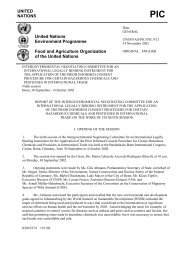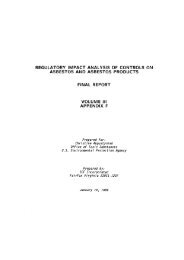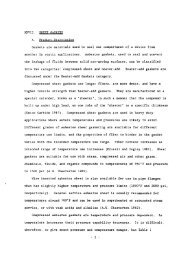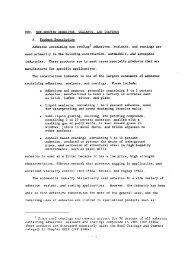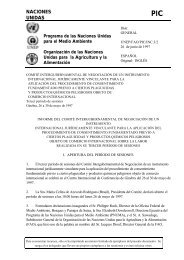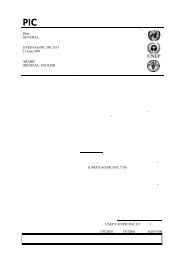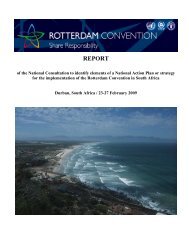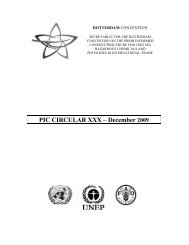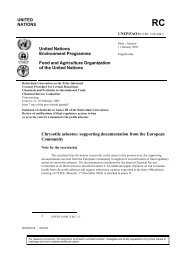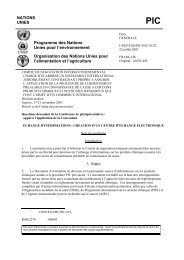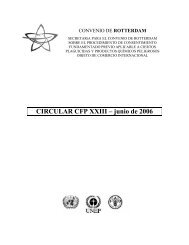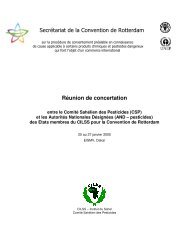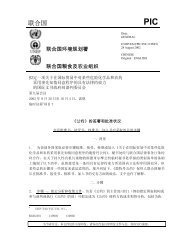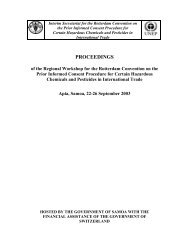Rep o rt of th e tw en - Rotterdam Convention
Rep o rt of th e tw en - Rotterdam Convention
Rep o rt of th e tw en - Rotterdam Convention
Create successful ePaper yourself
Turn your PDF publications into a flip-book with our unique Google optimized e-Paper software.
experi<strong>en</strong>ce wi<strong>th</strong> IPM field schools, as <strong>of</strong> 2004, <strong>th</strong>e provinces <strong>of</strong> Sindh and Punjab already embraced<br />
FFSs as <strong>th</strong>e dominant interface be<strong>tw</strong>e<strong>en</strong> governm<strong>en</strong>t and farmers. FFSs filled <strong>th</strong>e need <strong>th</strong>at regular<br />
ext<strong>en</strong>sion had not be<strong>en</strong> able to satisfy. Impo<strong>rt</strong>antly, in order to sustain <strong>th</strong>e IPM activities, <strong>th</strong>e<br />
Pakistan National Programme organized <strong>th</strong>e 5 <strong>th</strong> IPM Farmer Congress at Sukkur, Sindh from<br />
23-25 April 2005 for providing a platform for sharing <strong>th</strong>e progress <strong>of</strong> IPM projects. The congress<br />
reviewed <strong>th</strong>e IPM activities carried out during <strong>th</strong>e past cotton season and farmers shared <strong>th</strong>eir<br />
experi<strong>en</strong>ces. Main outcome <strong>of</strong> <strong>th</strong>e congress was <strong>th</strong>e formation <strong>of</strong> Sindh Agriculture Developm<strong>en</strong>t<br />
Organization (SADO) and <strong>th</strong>e action plan <strong>of</strong> SADO for 2005. The organization will work as an<br />
IPM ne<strong>tw</strong>ork <strong>of</strong> all district and village organizations in Sindh. A national congress has be<strong>en</strong> proposed<br />
to be held at <strong>th</strong>e <strong>en</strong>d <strong>of</strong> 2005 to integrate IPM farmer organizations at <strong>th</strong>e national level. In China,<br />
in <strong>th</strong>e Provinces <strong>of</strong> Anhui, Hubei and Shandong and some areas in H<strong>en</strong>an and Sichuan, <strong>th</strong>e Programme<br />
succeeded in establishing a strong team <strong>of</strong> young and g<strong>en</strong>der-balanced facilitators. Farmer education<br />
in IPM helped cut pesticide applications from an average <strong>of</strong> 12 to 7 per season.<br />
During its five-year period, <strong>th</strong>e Programme organized 25 Training-<strong>of</strong>-Facilitators (ToF) courses<br />
for 794 facilitators in <strong>th</strong>e six member countries. Overall, <strong>th</strong>e number <strong>of</strong> facilitators exceeded <strong>th</strong>e<br />
target <strong>of</strong> a capacity to educate 50 000 farmers per year. The success <strong>of</strong> an IPM <strong>en</strong>abling policy<br />
suppo<strong>rt</strong> in some countries and <strong>th</strong>e <strong>en</strong>couraging impact assessm<strong>en</strong>t results have created an conducive<br />
<strong>en</strong>vironm<strong>en</strong>t for addressing policy implications <strong>of</strong> IPM in member countries. During <strong>th</strong>e period,<br />
<strong>th</strong>e Programme organized 2 114 FFSs for 53 725 farmers. The impact assessm<strong>en</strong>t results showed<br />
<strong>th</strong>at FFS alumni increased <strong>th</strong>eir income by 25%, and reduced pesticide use by more <strong>th</strong>an 40% as<br />
compared to <strong>th</strong>e control sample.<br />
FAO Regional Vegetable IPM Programme in Asia<br />
The misuse and overuse <strong>of</strong> pesticides in vegetable production in tropical Asia provides <strong>th</strong>e<br />
rationale for <strong>th</strong>e establishm<strong>en</strong>t <strong>of</strong> <strong>th</strong>e Programme. Since 1996, <strong>th</strong>e programme has worked wi<strong>th</strong><br />
governm<strong>en</strong>ts and NGOs in its sev<strong>en</strong> member countries to develop robust national programmes aimed<br />
at carrying out applied research, ext<strong>en</strong>sion and farmer education activities. This is to promote and<br />
suppo<strong>rt</strong> Integrated Pest Managem<strong>en</strong>t (IPM) in vegetables by Asian smallholder farmers.<br />
During its first phase, <strong>th</strong>e Programme focused on <strong>en</strong>hancing <strong>th</strong>e governm<strong>en</strong>ts’ and NGOs’<br />
capability to implem<strong>en</strong>t training programmes in its member countries using <strong>th</strong>e ‘Training <strong>of</strong> Trainers<br />
(TOT)’ and ‘Farmer Field School (FFS)’ approaches. More <strong>th</strong>an 600 trainers and 30 000 farmers<br />
have be<strong>en</strong> trained since <strong>th</strong>e beginning <strong>of</strong> <strong>th</strong>e first phase.<br />
The achievem<strong>en</strong>ts in <strong>th</strong>e first phase led to <strong>th</strong>e second phase (2002-2007) which was financed<br />
by multiple donors including Ne<strong>th</strong>erlands, Australia, and Norway wi<strong>th</strong> contributions wo<strong>rt</strong>h<br />
US$ 7.5 million. Placing emphasis on vegetable IPM farmer pa<strong>rt</strong>icipatory training and research<br />
wi<strong>th</strong> a shaper focus on major crops and pests, <strong>th</strong>e second phase covers Cambodia, Lao PDR, Thailand,<br />
Viet Nam, and Yunnan Province <strong>of</strong> China P.R. in <strong>th</strong>e Greater Mekong Sub-region.<br />
At <strong>th</strong>eir 5 <strong>th</strong> bi-annual meeting in Luang Prabang, Lao People’s Democratic <strong>Rep</strong>ublic, from<br />
27-29 April 2005, repres<strong>en</strong>tatives <strong>of</strong> <strong>th</strong>e Programme’s Greater Mekong Sub-region member countries<br />
shared and discussed <strong>th</strong>eir country progress and experi<strong>en</strong>ces during <strong>th</strong>e first phase, as well as<br />
programme strategies and implem<strong>en</strong>tation plans until 2007. To address diversity among <strong>th</strong>e country<br />
programmes in terms <strong>of</strong> programme developm<strong>en</strong>t, each country analyzed constraints faced, needs,<br />
as well as chall<strong>en</strong>ges and oppo<strong>rt</strong>unities. The meeting was also att<strong>en</strong>ded by resource persons,<br />
repres<strong>en</strong>tatives <strong>of</strong> NGOs, FAO-IPM staff from each member country as well as donor repres<strong>en</strong>tatives.<br />
Notewo<strong>rt</strong>hy is <strong>th</strong>e fact <strong>th</strong>at <strong>th</strong>e governm<strong>en</strong>t <strong>of</strong> Viet Nam is putting significant resources into<br />
work towards safe vegetables and developm<strong>en</strong>t <strong>of</strong> related standards; in Thailand, <strong>th</strong>e Depa<strong>rt</strong>m<strong>en</strong>t <strong>of</strong><br />
82



